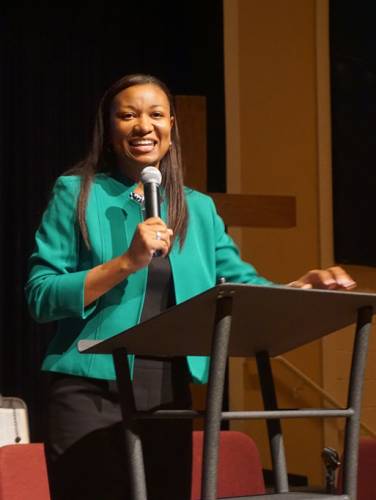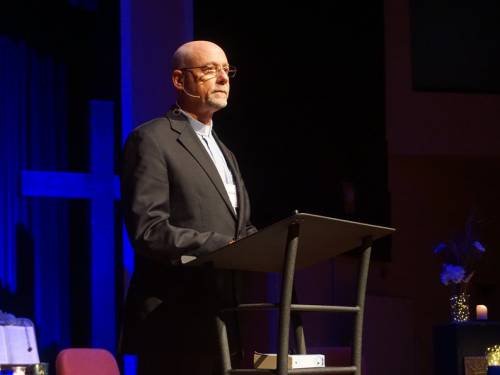2017 National Gathering, ‘Deep & Wide: Making Missional Disciples,’ draws over 200 church leaders
by Emily Enders Odom | Presbyterian News Service

Alice Ridgill. (Photo by Emily Enders Odom)
LAKELAND, Fla. – Midway through The Fellowship Community’s 2017 national gathering — held Feb. 21–23 at the First Presbyterian Church, Lakeland, Florida — incoming TFC Board President the Rev. Dr. Jerry Andrews led the board’s presentation on “The State of The Fellowship Community” (TFC).
Andrews, senior pastor of First Presbyterian Church, San Diego, reminded the gathering of over 200 pastors, elders and church leaders that “we exist for the sake of each other — for the sake of each other is worth the effort.”
The Fellowship Community (TFC) — the result of a 2014 merger of the former Fellowship of Presbyterians and Presbyterians for Renewal — is “a network of churches and leaders called together to proclaim the gospel of Jesus Christ by growing in Christ’s likeness, living by God’s word, and joining in God’s mission in the world.”
Drawing the gathering’s attention to what he humorously called “the most redundant title in all of Christendom,” Andrews emphasized the organization’s purpose. “We gather,” he said, “for the sake of the PC(USA — which is not the first and foremost [reason], but is not to be downplayed… God has called us in the PC(USA) to live out an evangelical witness with integrity. If we are in this place, God has called us for his own purposes. That’s the project we’re on.”
Through worship, music, Bible study, a wide selection of workshop offerings and thought-provoking panels and presentations, gathering participants were challenged and encouraged by leading missional practitioners, theologians and church leaders over the three days of the conference.
In introducing her sermon titled “Come, Follow Me,” on Feb. 22, the Rev. Dr. Alice Ridgill, pastor of New Faith Presbyterian Church, Greenwood, S.C., told the gathering her preaching ministry is one of encouragement. “My aim is to encourage and inspire you to purpose, persistence and pride,” she said.
Preaching on the call of the first disciples in Mark 1:16-20, Ridgill spoke to how God uses “ordinary people to do extraordinary things.”
Of the four biblical fishermen, Peter, Andrew, James and John, Ridgill said that Jesus’ three simple words, “Come, follow me,” “changed the trajectory of their ordinary lives and caused them to abandon what they knew and follow him.”
“God is calling us in 2017 to leave our comfort zone — to do something we’ve never done before,” she preached to the conference’s theme of making missional disciples. “The three ‘Cs’ of life are choices, chances and changes. You must make a choice to take a chance or your life will never change. Can I redo it for our context? Can I say to us today as those who are called to be missional disciples? We must make a choice to take a chance or someone else’s life will never change.”
Ridgill then drew from the text four alliterative principles for those who would be disciples making disciples: context, conversation, connection and confidence. Of the last principle, Ridgill emphasized that because Jesus had earned the fishermen’s confidence, he was able to enlist their commitment.
“Being a missional disciple is no walk in the park, but it is exactly what Christ calls us to do,” she said. “He is not God far away, but God with us. Because he came, we are here today gathered as his body, committed to his call and to his church.”
To show what that commitment can look like when a church makes the shift to a missional discipleship culture, a three-member panel moderated by Alex Absalom — the gathering’s main speaker — witnessed to how Ridgill’s four disciple-making principles were being put into practice in their respective contexts.

Joy Laughridge, John Fullerton, Mike McClenahan, Alex Abasalom (Photo by Emily Enders Odom)
Speakers on the panel were the Rev. Dr. Mike McClenahan, senior pastor and head of staff, Solana Beach Presbyterian Church, Solana Beach, Calif; the Rev. Dr. John Fullerton, lead pastor, and the Rev. Joy Laughridge, pastor for Outreach and Ministry, St. Andrews Presbyterian Church, Dunedin, Florida.
Two examples of missional programs that “take the church out of the church building” were shared by the pastors of St. Andrews, namely Car Care Ministry, which provides a setting in which people can come together around car repair and maintenance, and Loving You Where You Are At, a mission to women primarily working in the adult entertainment industry.
“We are going into these places and bringing a drink of living water,” Laughridge said. “I have to say it’s a very slow ministry — you have to be committed for the long term. Ultimately there may be some discipling that happens outside of church through these relationships. They are recognizing that it is Jesus that is reaching out to them.”
In the Q&A session that followed the panel, Fullerton elaborated on how St. Andrews innovated these and other ministries. “We want to be the leaders in the world that push back the darkness,” he said. “I’d ask you, ‘Where is the darkness in your context — name it, what is it?’ Second question, ‘What’s already in your church? What’s the thing that’s already ready to go that might be matched to address that darkness?’”
“Ask God what the needs are,” Laughridge added. “Who is vulnerable?”
Following lunch — which included special gatherings for alumni and prospective students hosted by Pittsburgh Theological Seminary, Princeton Theological Seminary, and Union Presbyterian Seminary — the gathering met the Rev. Dr. Carlos Emilio Ham, president of the Matanzas Evangelical Theological Seminary in Cuba. Marilyn Borst, associate director for Partnership Development for The Outreach Foundation and a TFC Board member, interviewed Ham, the Wednesday evening preacher, whom she introduced as “one of the great global voices.”
The theme of welcome continued as Ridgill joined four colleagues on a panel titled “Making Missional Disciples through Racial Justice & the Gospel,” moderated by the Rev. Dan Baumgartner, a member of the TFC board and pastor, First Presbyterian Church, Hollywood, Calif.
“There are major tensions around race in our country, and the evangelical church has been slow to address these issues,” Baumgartner said in introducing the topic.
Panel members, in addition to Ridgill and McClenahan, were Maurice Lattimore, deacon, North Avenue Presbyterian Church, Atlanta; the Rev. Brian K. McCollum, director of alumni relations, Princeton Theological Seminary; and the Rev. John Schmidt, senior pastor, Central Presbyterian Church, Towson, Maryland.
Lattimore said that he had found the North Avenue Church by way of homelessness. “I knew when I got to that shelter that I needed a spiritual home,” he said. “[So I prayed] Lord, lead me to a spiritual home…lead me to a church I need to go to, but everyone in there looked like Pastor Dan. Then the Holy Spirit said, ‘Sit your butt down!’ They became willing to embrace me and give me not a handout, but a hand up. The church was willing to cross that cultural line to start developing diversified relationships with one who was homeless. What Pastor John [Schmidt] said, the willingness to cross the cultural line and get involved with people who are different from you is one way straight toward bettering the situation.”
McClenahan began his remarks by owning that, as an evangelical, he had never talked much about immigration before, but that in the mostly white Solana Beach, there is a historic Hispanic community that came to work the fields. His awakening to the issues resulted in a church-led initiative — 200 volunteers strong — to tutor the farmworkers’ children.
“When we talk about welcoming the stranger, we’re talking about 92 times in the New Testament,” McClenahan said. “We need to be able to talk about these things and create a gracious context for the conversation. The church has got to rise up and be the church, whatever your politics. We don’t need to vote Republican or Democratic to know that a child needs to be tutored or needs help to go to college. I don’t need to twist people’s arms to teach a citizenship class — this is the body of Christ being the body, to work toward action, not just talk. What does love require? How do we show mercy, justice and love?”

Carlos Emilio Ham. (Photo by Emily Enders Odom)
Wednesday evening’s program concluded with worship, at which Ham preached on Acts 1:1-8, focusing on the promise of the Holy Spirit and Jesus’ proclamation, “You will be my witnesses.”
Ham explained that Theophilus, to whom the Gospel of Luke and the Book of Acts are addressed, translates as “friend of God.”
“We have been reflecting quite a bit — in our workshop and in visits of groups to our country — on the importance of being a friend,” he said. “It’s interesting in these 60 years of Cuban Revolution, with the animosity between both administrations, that in spite of rumors of war, we have always managed to be friends. We have managed to play a pontifical role between our both nations. That is the case because each and every one of us is a Theophilus, friends of God, friends of each other in God. Nothing can compare with friendship, and how friendship can do miracles in our different mission endeavors.”
Tying the text to the experience of Christian repression in his native Cuba, Ham said, “Because we could not proclaim the gospel verbally, we did it through our actions, precisely because of the empowerment by the Holy Spirit.”
“We are called to be expeditionaries — to risk our safety, to renounce our comfort zone, to carry out our explicit witnessing,” Ham preached. “That is the blessing that we have in Cuba today, where the Communist party is not only allowing but expecting from the church to be explicit witnesses of sharing hope, peace and reconciliation in the transformation of our nation.”
Also on Feb. 22 — and concluding on Feb. 23 — Alex Absalom, a coach, speaker and writer on the practicalities of transitioning churches into disciple-making cultures, gave the remaining three of his four scheduled plenary presentations; the Rev. Dr. Mark D. Roberts, executive director of the Max De Pree Center for Leadership at Fuller Theological Seminary, completed his Bible study on Ephesians; and the Rev. Zachary McGowen, associate pastor of evangelism and congregational development at First Presbyterian Church, Lakeland, delivered the closing sermon.
The Fellowship Community’s next sponsored event will be a theology conference featuring Kevin Vanhoozer, PhD, research professor of systematic theology at Trinity Evangelical Divinity School. The conference, titled “The Reformation, The Church, The Solas,” is “intended for all who are called to think about the faith, especially those within the Reformed faith.” It will be hosted by and held at First Presbyterian Church of San Diego on May 15–17.
![]() You may freely reuse and distribute this article in its entirety for non-commercial purposes in any medium. Please include author attribution, photography credits, and a link to the original article. This work is licensed under a Creative Commons Attribution-NonCommercial-NoDeratives 4.0 International License.
You may freely reuse and distribute this article in its entirety for non-commercial purposes in any medium. Please include author attribution, photography credits, and a link to the original article. This work is licensed under a Creative Commons Attribution-NonCommercial-NoDeratives 4.0 International License.
Categories: Church Transformation, Presbyterian News Service
Tags: Alex Absalom, alice ridgill, Carlos Emilio Ham, cuba, disciple making, First Presbyterian Church of Lakeland, Jerry Andrews, Mark Roberts, Matanzas Evangelical Theological Seminary, national gathering, pcusa, Pittsburgh Theological Seminary, presbyterian, princeton seminary, The Fellowship Community, The Outreach Foundation, Union Presbyterian Seminary, Zachary McGowen